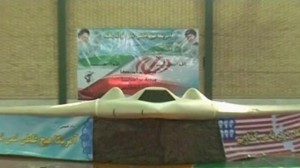
An outstanding piece of bargaining power for Iran with both Russia and China….don't expect UN sanctions anytime soon…..
Updated 11 Dec 2011 to add more stories with photos and comment.
Iran won't return U.S. drone it claims to have
Iran Shows Video It Says Is of U.S. Drone
Zakaria and Baer: Downed U.S. drone an intel catastrophe
Phi Beta Iota: Variants of this stuff are for sale at Brookstone and Best Buy. The US has consistently refused to be serious about emission control, downlink security, and real-time processing. This is a “disaster” only to the degree that it reveals–once again–how immature the US “intelligence” archipelago of fiefdoms actually is.
Iran shows film of captured US drone
BBC, 8 December 2011
Iranian TV has shown the first video footage of an advanced US drone aircraft that Tehran says it downed near the Afghan border.
Images show Iranian military officials inspecting the RQ-170 Sentinel stealth aircraft which appears to be undamaged.
US officials have acknowledged the loss of the unmanned plane, saying it had malfunctioned.
However, Iranian officials say its forces electronically hijacked the drone and steered it to the ground.

BBC security correspondent Frank Gardner says the intact condition of the Sentinel tends to support their claim.
Iran's Press TV said that the Iranian army's “electronic warfare unit” brought down the drone on 4 December as it was flying over the city of Kashmar, about 140 miles (225km) from the Afghan border.
Nato said at the weekend that an unarmed reconnaissance aircraft had been flying a mission over western Afghanistan late last week when its operators lost control of it.
Pentagon officials have said they are concerned about Iran possibly acquiring information about the technology.
Phi Beta Iota: Our first impression has been that Iran has downed the UAV with an Electromagnetic Pulse (EMP) beam. This is much cooler. As with the Taliban in Afghanistan able to hijack the downlinks, the Iranians simply hijacked the entire aircraft. From where we sit, the Chinese (who ride electric power circuits into “isolated” computers) and the Iranians [Persians, more PhDs per capita than most] are laughing at us, while the Russians simply ignore us. Newsflash for the Pentagon: our technology is not that great. Classifying the idiot vulnerabilities does not work–something we have been pointing out for twenty years.
Bob Seelert, Chairman of Saatchi & Saatchi Worldwide (New York): When things are not going well, until you get the truth out on the table, no matter how ugly, you are not in a position to deal with it.
See Also:
Dolphin: Their Drones, Our Drones, and EMP Rays
Journal: Insurgents Hack U.S. Drones
Journal: Gorgon Stare (All Eyes, No Brain)






